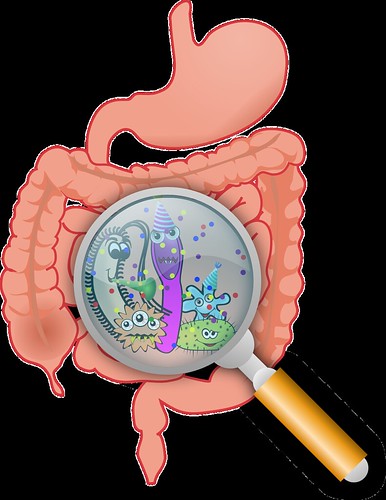
Guest Writer HOW IT WORKS
science and society health human disease medicine microbiome
Go With Your Gut...
Have you ever gotten sick and relied on your immune system to help fight off the pathogen infecting you? What if your immune system was the one attacking you to begin with?! And on top of that, what if the native species living in your gut were the ones responsible for this attack?! This may seem like a cruel joke, but this is actually the scary reality for people living with autoimmune diseases.
For many years, autoimmune diseases have puzzled doctors, scientists, and most importantly, the victims of these diseases. An autoimmune disease occurs when the cells of your immune system, which are supposed to be protecting you from harm, don’t recognize your own cells as “self”. This means that your immune cells think* everything* is a pathogen. As a result, your immune cells attack your own cells as if they are foreign invaders [1]. Some common autoimmune diseases are Multiple Sclerosis, Type 1 Diabetes, and Rheumatoid Arthritis, which consist of symptoms including numbness, fatigue, and aching muscles, respectively [1]. People who suffer from autoimmune diseases are able to take different types of medication to alleviate their symptoms, but there is unfortunately no cure for autoimmune diseases [1]. While this is a good start to understanding autoimmune diseases, could there be more to the story?
Recent studies have suggested that the human gut microbiome may play a key role in the origins of autoimmune diseases [2]. The gut microbiome consists of many different species, called microbes, including viruses, fungi, and bacteria, which coexist and interact with each other [3]. This means that these species work together to live in the shared environment of a healthy gut. When there is an imbalance in the ratio of the healthy microbes found in the gut, it is referred to as dysbiosis. This phenomenon has recently been linked to many autoimmune diseases [2]. Let’s stop and think about that for a second. If the proportion of organisms living inside of my gut is altered, then my body could potentially attack itself?! Before we freak out, let’s look closer at a common autoimmune disease: Multiple Sclerosis (MS).

Figure 1. The Gut Microbiome. (Source: Pixabay)
MS is a disease where immune cells damage the healthy cells of the brain and spinal cord [4]. People suffering from MS have a gut microbiome that contains different species that aren’t traditionally found in healthy people. These bacteria have been seen to activate an immune response that results in the attack on “self” cells [5]. While all of this seems scary, a recent study showed that mice with MS had their symptoms alleviated after taking antibiotics [6]! In this experiment, one group of mice with MS were given an antibiotic treatment and another group of mice with MS were not. The results showed that the group who was given the antibiotic treatment had less damage to their own cells [6]. These results could offer insight and possible treatment opportunities for people suffering from MS! Of course, more research must be done, but this is a great start in identifying a relationship between the gut microbiome and autoimmune diseases.
While leading research aims to identify this novel relationship, what does this mean for those currently battling autoimmune diseases? It can be hard to take in the reality that your own body is attacking itself, but while your body is busy tearing you down, a strong emotional support system can help to build you up. Surrounding yourself with positive people can help to make all the difference in the day to day struggles of autoimmune diseases.
References
Watson, S. (2017, October 18). Autoimmune Diseases: Types, Symptoms, Causes and More. Retrieved September 24, 2018, from https://www.healthline.com/health/autoimmune-disorders
Li, B., Selmi, C., Tang, R., Gershwin, M. E., & Ma, X. (2018, April 30). The microbiome and autoimmunity: A paradigm from the gut–liver axis. Retrieved September 24, 2018, from https://www.nature.com/articles/cmi20187
Yang, J. (2012, July 16). The Human Microbiome Project: Extending the definition of what constitutes a human. Retrieved September 24, 2018, from https://www.genome.gov/27549400/the-human-microbiome-project-extending-the-definition-of-what-constitutes-a-human/
Zoppi, L. (2018, August 23). Cognitive Impairment and Multiple Sclerosis. Retrieved October 1, 2018, from https://www.news-medical.net/health/Cognitive-Impairment-and- Multiple-Sclerosis.aspx
Begley, S. (2017, September 11). Gut microbiome plays role in multiple sclerosis, studies show. Retrieved October 1, 2018, from https://www.statnews.com/2017/09/11/gut-microbiome-multiple-sclerosis/
Yokote, H., Miyake, S., Croxford, J. L., Oki, S., Mizusawa, H., & Yamamura, T. (2008, December). NKT Cell-Dependent Amelioration of a Mouse Model of Multiple Sclerosis by Altering Gut Flora. Retrieved September 20, 2018, from https://www.ncbi.nlm.nih.gov/pmc/articles/PMC2626383/
About the Author: Jaime Savage
As a senior Microbiology major at UMass Amherst, I have learned a lot about the different types of diseases caused by various microbes over the past four years. Of these, the most interesting microbe-related diseases to me stem from the gut microbiota, in particular autoimmune diseases. As an aspiring Physician’s Assistant, the link between microbiology and pathology is one of my passions, and something I hope to continue exploring in the future!

More From That’s Life [Science]
- CRISPR technology may be a promising tool to combat multidrug resistant fungus C. auris
- How the search for a universal gene forever changed biology: the story of Carl Woese and 16S sequencing
- Quarantine Blues? The Effects of Social Isolation in the Brain
- The Lovebug Effect
- CRISPR: Careful When Running with Genetic Scissors
- More ›
